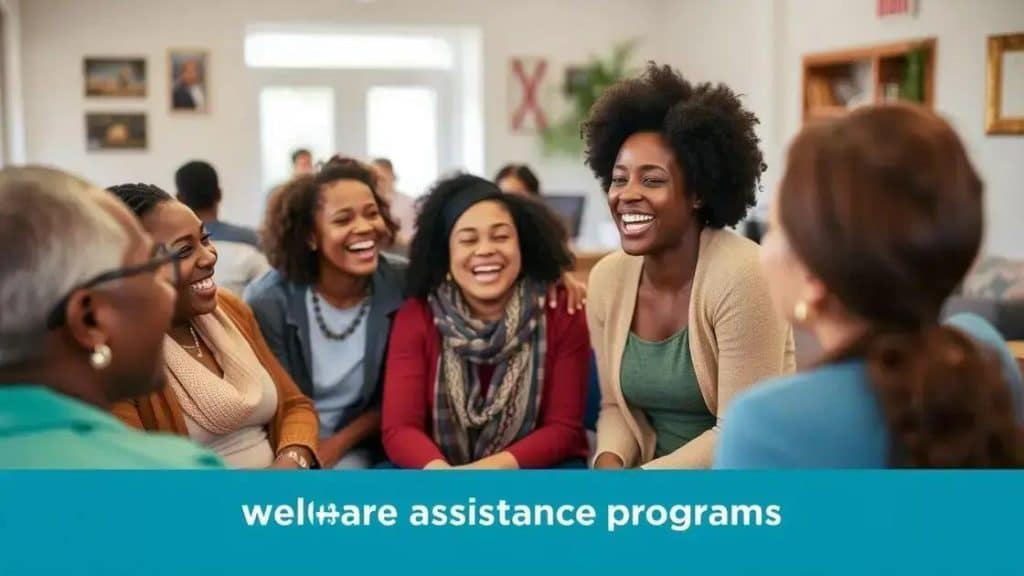Laugh public assistance access and improve your situation

Using laughter in challenging situations enhances resilience and fosters connections, making it easier to cope with hardships while navigating public assistance programs.
Laugh public assistance access often feels daunting, but a little humor can transform the experience. Have you ever wondered how laughter can ease the stress of navigating these systems? Let’s dive into this fascinating intersection.
Understanding public assistance programs
Understanding public assistance programs is crucial for many individuals and families who need support. These programs exist to help those facing financial difficulties gain access to essential resources that can improve their situation.
The core purpose of public assistance programs is to provide aid to those who qualify. Some of the main programs include food assistance, housing support, and healthcare services. In this article, we will explore each of these areas, helping you understand how to navigate the system more effectively.
Types of Public Assistance Programs
Various public assistance programs cater to different needs. Here are some of the most common:
- Food Assistance: Programs like SNAP (Supplemental Nutrition Assistance Program) help families afford groceries.
- Housing Support: Programs offer rental assistance or subsidies to help with housing costs.
- Healthcare Services: Medicaid and CHIP provide medical services for low-income families.
- Employment Assistance: Programs help individuals prepare for jobs and find employment opportunities.
These public assistance programs aim to relieve financial pressure on families. Understanding these resources can empower individuals to take control of their circumstances.
How to Qualify for Assistance
Qualifying for public assistance programs depends largely on your income, household size, and specific needs. Most programs use similar criteria, focusing on income levels to determine eligibility.
It’s essential to gather relevant documents, such as proof of income and identification, to apply. Be aware that some programs require you to reapply periodically to continue receiving assistance. This process may seem challenging, but it is designed to ensure that those who need help receive it.
Common Challenges in Accessing Programs
Many people face challenges when trying to access public assistance. Here are a few issues they may encounter:
- Complex application processes that can be confusing.
- Long wait times for approval or assistance.
- Stigma associated with receiving help.
Despite these challenges, it’s important to remember that support is available. With the right information and resources, you can navigate these programs more effectively.
Ultimately, understanding public assistance programs empowers individuals and families to seek the help they need. Knowing what resources are available can make a significant difference in your quality of life.
The role of humor in challenging situations

The role of humor in challenging situations is often underestimated. Humor can be a powerful tool for easing stress and fostering connections among individuals dealing with difficulties. In the context of public assistance, laughter can transform an otherwise daunting experience into a more manageable one.
When people find a way to laugh, they tend to feel lighter in their situations. This can help build resilience and encourage a positive outlook. Humor often provides a sense of relief, helping individuals cope with the pressures they face while navigating public assistance programs.
Benefits of Humor
There are several benefits to incorporating humor into tough times:
- Reduces Stress: Laughter releases endorphins, which help alleviate feelings of anxiety.
- Strengthens Relationships: Sharing a laugh can bring people closer together, fostering support networks.
- Enhances Problem Solving: A lighter mood allows for clearer, more creative thinking.
- Improves Outlook: Humor can shift focus away from problems, promoting a more positive mindset.
In public assistance settings, where stress levels may be high, finding moments to laugh can make a significant difference. It’s a simple yet effective way to cope with challenges.
Using Humor Effectively
To use humor effectively, it’s important to consider the context. Not every joke is suitable for every situation. Timing is essential; a well-placed joke can break tension, while an ill-timed one may have the opposite effect. Keep it light and relatable, making sure it resonates with those around you without being offensive.
Incorporating humor into conversations, especially when discussing public assistance, can help humanize the experience. Sharing funny anecdotes or light-hearted stories can provide comfort to those feeling overwhelmed. This creates a shared space where individuals feel understood and supported.
Ultimately, integrating humor in challenging situations not only aids in coping but also enhances the overall experience within public assistance programs. By finding joy in difficult moments, individuals can navigate their journeys with greater ease.
Tips for accessing assistance more effectively
Tips for accessing assistance more effectively can make a significant difference in the experience of individuals seeking public aid. Knowing how to navigate the system can help alleviate some of the stress involved.
First and foremost, it’s essential to do your research. Understand the different programs available and what they offer. Each program has unique eligibility requirements, so knowing your options is vital. Start by visiting official websites or local offices to get accurate information.
Gather Necessary Documentation
Having the right documents ready can streamline your application process. Here are key items to prepare:
- Proof of Identity: This could include your driver’s license or state ID.
- Income Verification: Pay stubs, tax returns, or bank statements are helpful.
- Proof of Residency: Utility bills or lease agreements can serve this purpose.
- Social Security Numbers: For every member of your household.
By organizing these documents ahead of time, you can save yourself time and frustration during the application process.
Be Prepared for Wait Times
Accessing assistance often involves waiting—whether it’s on the phone or in person. Staying patient and prepared can ease some of the frustration. Bring something to keep you occupied, such as a book or a mobile game. If you’re able to, consider going to the office at off-peak times to reduce wait times.
Also, do not hesitate to ask questions. Knowing what to expect can help you feel more confident about the process. Most staff members are there to help, so communicate your needs clearly.
Follow Up on Your Application
After submitting your application, follow up regularly. Checking in can ensure your application is being processed and that you haven’t missed any vital information or requests for further documentation.
Using phone calls or online portals can help keep you informed. Staying proactive can help prevent delays in receiving the assistance you need.
Ultimately, utilizing these tips for accessing assistance more effectively can ease your journey through public assistance programs. With the right preparation, patience, and communication, you can access the help you need with more simplicity.
Success stories of laughter in hardships

Success stories of laughter in hardships highlight how humor can help individuals overcome challenging situations. These stories often show that laughter can be a form of resilience, helping people cope with difficulties.
Consider the story of a family who faced financial struggles after losing a job. Instead of letting the stress consume them, they began to share funny moments that had happened throughout the day. This simple practice helped lighten their mood and strengthen family bonds. They found that laughter was a bridge that connected them, even during tough times.
Examples of Humor in Hardship
Here are a few other examples of how laughter played a crucial role in tough situations:
- Community Support: A group of neighbors organized a block party to lift spirits during a community crisis. By sharing jokes and stories, they created a supportive atmosphere.
- Personal Growth: An individual shared their story of recovering from illness through comedy. By using humor to recount experiences, they inspired others facing similar challenges.
- Workplace Resilience: In a company facing layoffs, employees created a humor program to boost morale. Their shared laughter helped maintain a sense of normalcy and support.
These stories illustrate that laughter can act as a powerful coping mechanism. It helps to foster connection, alleviate stress, and create a sense of community in challenging times.
Finding Humor in Daily Life
Finding humor in everyday life can be an effective way to deal with hardships. Whether it’s through funny movies, jokes shared with friends, or even humorous social media content, keeping a light-hearted perspective can make a significant difference.
For many, humor serves as a reminder that even in difficult situations, there is still room for joy. Those who share their struggles with laughter often inspire others to find lightness as well. Sharing uplifting experiences creates a ripple effect that can benefit others who may feel alone in their challenges.
Ultimately, success stories of laughter in hardships show us the strength that humor can bring. By embracing laughter, individuals can find hope, resilience, and community support in even the most challenging circumstances.
The power of laughter in challenging times is truly remarkable. It not only helps us cope with hardships but also brings us closer to others. By openly embracing humor, we create connections and foster resilience in our communities. Remember, even in difficult situations, finding reasons to laugh can lead to hope and healing. Let’s continue to share our stories and support one another through laughter and joy!
FAQ – Frequently Asked Questions about Laughing Through Hardships
How can humor help during tough times?
Humor provides a way to cope with stress and maintains a positive perspective, helping to strengthen resilience.
What are some examples of laughter easing hardship?
Stories of communities coming together to share laughter and support during crises demonstrate the power of humor in overcoming challenges.
Why is it important to share humorous experiences?
Sharing funny stories creates connections and fosters a sense of belonging, helping others feel less alone in their struggles.
Can laughter improve mental health?
Yes, laughter can reduce stress, improve mood, and promote social interactions, contributing positively to overall mental health.





